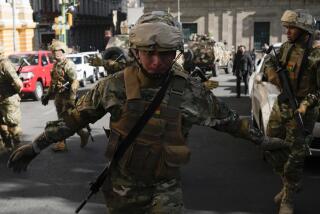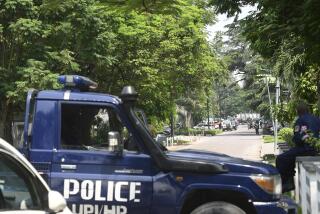U.N. Aide Says Burundi Coup Over, Officials Back in Charge
- Share via
BUJUMBURA, Burundi — The military coup that toppled Burundi’s first democratically elected government last week has collapsed, a U.N. official said Thursday.
“The government has effectively reassumed power,” James Jonah, the U.N. undersecretary general for political affairs, told reporters after meeting with coup leaders. “I was assured by the army commander that he recognizes the civilian leaders and (that) the troops will retire to barracks.”
Jonah said he was discussing with surviving members of the civilian government the size and makeup of an international force they say they need for protection.
Prime Minister Sylvie Kinigi and seven other surviving Cabinet members took refuge in the French Embassy in Bujumbura. As the coup showed signs of crumbling in recent days, they began reasserting their authority.
The collapse of the coup had been announced earlier by Radio Burundi in what it described as a “government communique.” The station had under military control.
The station said Francois Ngeze, a former foreign minister named by the military as head of state, was placed under house arrest.
It also said 15 officers who took part in the Oct. 21 coup fled the country to escape arrest. The military had been seeking amnesty for the soldiers.
President Melchior Ndadaye and at least four top aides were slain in the early hours of the coup, which set off a weeklong wave of ethnic killings among the majority Hutu people and the minority Tutsis.
Bishop Barnard Bududira, head of the Roman Catholic Church in Burundi, said the death toll could be higher than in 1988, when an estimated 20,000 people died in similar clashes.
Ndadaye, 40, a former banker, became the country’s first freely elected leader in June. He also was the first Hutu to lead the country since it won independence from Belgium in 1962.
The army coup leaders were Tutsis, who have dominated the military and the government for centuries despite the fact that Hutus represent about 85% of Burundi’s 5.4 million people.
More to Read
Sign up for Essential California
The most important California stories and recommendations in your inbox every morning.
You may occasionally receive promotional content from the Los Angeles Times.













